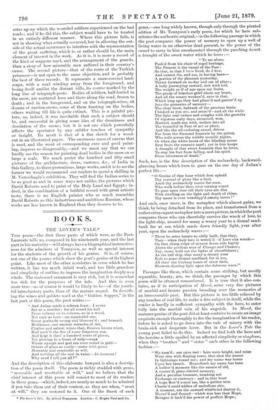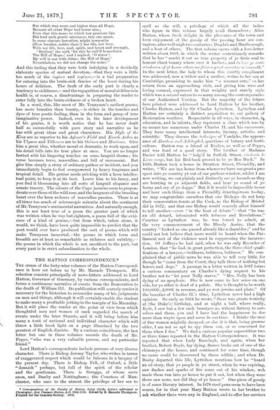BOOKS.
THE LOVER'S TALE.* Tim poem—the first three parts of which were, as the Poet- Laureate tells us, composed in his nineteenth year, and the last part in his maturity—will always have a biographical instructive- ness for the admirers of Tennyson, as well as special interest for the students of the growth of his genius. It is, of course, not one of the poems which show the poet's genius at its highest point. Like most of the other novelettes in verse which he has written, it has too much inlaid work, and too little grandeur and simplicity of outline, to impress the imagination deeply as a whole. The embossed ornament is very rich, but it is somewhat too rich for the purposes of the tale. And this is even more true—as of course it would be likely to be—of the youth- ful introductory parts, than of the mature sequel. In describ- ing the wines and goblets used at the " Golden Supper," in the last part of this poem, the poet writes :—
" And Julian made a solemn feast : I never
Sat at a costlier ; for all round his hall From column on to column, as in a wood, Not such as here—an equatorial one, Great garlands swung and blossom'd ; and beneath Heirlooms, and ancient miracles of Art, Chalice and salver, wines that, Heaven knows when, Had suck'd the fire of some forgotten sun, And kept it thro' a hundred years of gloom, Yet glowing in a heart of ruby—cups
Where nymph and god ran ever round in gold—
Others of glass as costly—some with gems Moveable and resettable at will, And trebling all the rest in value—Ah heavens !
Why need I tell you all ?"
And the description of this elaborate banquet is also a descrip- tion of the poem itself. The poem is richly studded with gems, -" moveable and resettable at will," and we believe that the chief interest of this poem will consist to most of its readers in these gems,—which, indeed, are nearly as much to be admired if you take them out of their context, as they are when, " reset at will," they are restored to it. One of the finest of such
• The Lorer's Tale. By Alfred Tennyson. London : C. Regan Paul and Co.
gems,—one long widely known, though only through the pirated edition of Mr. Tennyson's early poem, for which he • here sub- stitutes the authentic original,—is the following passage in which the poet compares the power of memory to open up a well of living water in an otherwise dead present, to the power of the camel to carry in him unexhausted through the parching desert a draught of the sweet water which he loves :—
" To me alone,
Push'd from his chair of regal heritage, The Present is the vassal of the Peat :
So that, in that I have lived, do I live, And cannot die, and am, in having been—
A portion of the pleasant yesterday, Thrust forward on to-day and out of place; A body journeying onward, sick with toil, The weight as if of age upon my limbs, The grasp of hopeless grief about my heart, And all the senses weaken'd, save in that, Which long ago they had glean'd and garner'd up
Into the granaries of memory—
The clear brow, bulwark of the precious brain, Chinked as you see, and seam'd—and all the while The light soul twines and mingles with the growths Of vigorous early days, attracted, won, Married, made oue with, molten into all The beautiful in Past of act or place, And like the all-enduring camel, driven Far from the diamond fountain by the palms, Who toils across the middle moonlit nights, Or when the white heats of the blinding noons Beat from the concave sand ; yet in him keeps A draught of that sweet fountain that he loves, To stay his feet from falling, and his spirit From bitterness of death."
Such, too, is the fine description of the melancholy, backward- glancing hours which turn to gaze on the one day of Julian's perfect life :-
" 0 Genius of that hour which dost uphold
Thy coronal of glory like a God, Amid thy melancholy mates far-seen, Who walk before thee, ever turning round To gaze upon thee till their eyes are dim With dwelling on the light and depth of thine, Thy name is ever worshipp'd among hours !"
And such, once more, is the metaphor which almost gains, we think, by being detached from its place, and transformed from a rather extravagant metaphor into a mere picture, in whichthe poet compares those who can cheerfully survive the wreck of love, to the light-ship, moored for many a weary year to a dismal sand- bank far at sea, which sends down friendly light, year after
year, upon the melancholy waves :-
" There be some hearts so airily built, that they, They—when their love is wreck'd—if Love can wreck—
On that sharp ridge of utmost doom ride highly Above the perilous seas of Change and Chance; Nay, more, hold out the lights of cheerfulness ; As the tall ship, that many a dreary year Knit to some dismal sandbank far at sea, All thro' the livelong hours of utter dark,
Showers slanting light upon the dolorous wave."
Passages like these, which contain some striking, but mostly separable, beauty, are, we think, the passages by which this poem will be of tenest remembered. It is true that it also con- tains, as if in anticipation of Maud, some very fine pictures of morbid and insane passion brooding over the memories of an irrecoverable past. But this picture is too little relieved by any touches of real life, to make a fine subject in itself, while the reader is hardly in sufficient sympathy with the hero, to enter fully into the morbid vein of his anguish. In Maud, the maturer genius of the poet did at least contrive to create an image exquisite enough thoroughly to fire the imagination of his reader, before he is asked to go down into the vale of misery with the brain-sick and desperate lover. But in the Lover's Tale the young poet failed to do this. Indeed we find both the hero and the heroine a little spoiled by an affected simplicity or simplesse, when they " brother " and " sister " each other in the following fashion :-
" We timed : our eyes met : hers were bright, and mine
Were dim with floating tears, that shot the sunset In lightnings round me ; and my name was borne Upon her breath. Henceforth my name has been A hallow'd memory like the names of old, A center'd, glory-circled memory, And a peculiar treasure, brooking not Exchange or currency : and in that hour A hope flow'd round me, like a golden mist Charm'd amid eddies of melodious airs, A moment, ere the onward whirlwind shatter it, Waver'd and floated—which was less than Hope, Became it lnek'd the power of perfect Hope;
But which was more and higher than all Hope,
Because all other Hope had lower aim ; Even that this name to which her gracious lips Did lend such gentle utterance, this one name, In some obscure hereafter, might inwreathe (How lovelier, nobler then !) her life, her love, With my life, love, soul, spirit, and heart and strength. Brother,' she said, 'let this be call'd henceforth The Hill of Hope f and I replied, 0 sister ! My will is one with thine; the Hill of Hope.'
Nevertheless, we did not change the name."
And this feeling that they were both indulging in a decidedly elaborate species of mutual devotion,--that they were a little too much of the ingau and ingénue,—is a bad preparation for entering into the brain-sick fancies of the lover during his hours of delirium. The fault of the early part is clearly a tendency to sickliness ;—and the reQognition of moral sickliness in health is, of course, a disadvantage in preparing the reader to enter fully into the brain-sickness of a broken heart.
In a word, this, like most of Mr. Tennyson's earliest poems, has more beauties than beauty,—is richer in the touches and dyes of true poetic feeling, than in the form and grasp of true imaginative power. Indeed, even in the later development of his genius, it is worth notice that he has never dealt half as successfully with pure story and narrative as he has with great ideas and great characters. His Idyls of the King are as superior to his Aylmer's Field and Enoch. Arden as his Ulysses and Titkonus are to his Oriana and Mariana. Give him a great idea, whether moral or dramatic, to work upon, and his detail falls into its true place at once. You are no longer fretted with his lingering touches on some languid theme ; his verse becomes terse, masculine, and full of movement. But give him simply a story of ordinary pathos or incident, and you immediately begin to feel overpowered by heavy fragrance and tropical detail. His genius needs pricking with a keen intellec- tual point, to keep it at its best. Leave him to his fancy, and you find it blossoming into all sorts of languid elegance and ornate tracery. The odours of the Cape jasmine seem to prepon- derate over those of the wild rose, and the languors of the brooding heart over the keen ardours of masculine passion. There is at all times too much of microscopic minutiae about the sentiment of Mr. Tennyson's sentimental narratives. And naturally enough, this is not least true of a poem the greater part of which was written when he was but eighteen, a poem full of the evid- ence of a kind of genius,—but from which, taken alone, it would, we think, have been quite impossible to predict that the poet would ever have produced the sort of poems which will make Tennyson immortal,—the poems in which form and breadth are at least as remarkable as richness and subtlety,— the poems in which the whole is not sacrificed to the part, but every part is in strict subordination to the whole.



































 Previous page
Previous page